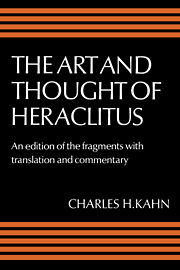 The Art and Thought of Heraclitus
The Art and Thought of Heraclitus The fragments
Published online by Cambridge University Press: 26 February 2010
Summary
I (D. 1, M. 1) Sextus Empiricus, Adversus Mathematicos VII. 132
τοῦ δὲ λόγου τοῦδ̕ ἐόντος αἰεὶ ἀξύνετοι γίνονται ἄνϑρωποι καὶ πρόσϑεν ἢ ἀκοῦσαι καὶ ἀκούσαντες τὸ πρῶτον̇ γινομένων γὰρ πάντων κατὰ τὸν λόγον τόνδε ἀπείροισιν ἐοίκασι πειρώμενοι καὶ ἐπέων καὶ ἔργων τοιουτέωνὁκοίων ἐγὼ διηγεῦμαι κατὰ φύσιν διαιρέων ἕκαστον καὶ φράζων ὃκως ἔχει̇ τοὺς δὲ ἄλλους ἀνϑρώπους λανϑάνει ὁκόσα ἐγερϑέντες ποιοῦσιν ὃκωσπερ ὁκόσα εὓδοντες ἐπιλανϑάνονται.
II (D. 34, M. 2) Clement, Stromateis V.115.3
ἀξύνετοι ἀκούσαντες κωφοῖσιν ἐοίκασι̇ φάτις αὐτοῖσι μαρτνρεῖ παρεόντας ἀπεῖναι.
III (D. 2, M. 23b) Sextus Empiricus, Adversus Mathematicos VIII.133
[διὸ δεῖ ἕπεσϑαι τῷ κοινῷ · ξυνὸς γὰρ ὁ κοινός.] τοῦ λόγου δ̉ ἐόντος ξυνοῦ ζὡουσιν οὶ ὡς ἰδίαν ἔχοντες φρόνησιν.
IV (D. 17, M. 3) Clement, Stromateis II.8.1.
οὐ γὰρ φρονέουσι τοιαῦτα πολλοὶ ὸκοίοις ἐγκυρέουσιν, οὐδὲ μαϑόντες γινώσκουσιν, ἑωυτοῖσι δὲ δοκέουσι.
Although this account holds forever, men ever fail to comprehend, both before hearing it and once they have heard. Although all things come to pass in accordance with this account, men are like the untried when they try such words and works as I set forth, distinguishing each according to its nature and telling how it is. But other men are oblivious of what they do awake, just as they are forgetful of what they do asleep.
Not comprehending, they hear like the deaf. The saying is their witness: absent while present.
Although the account is shared, most men live as though their thinking were a private possession.
Most men do not think things in the way they encounter them, nor do they recognize what they experience, but believe their own opinions.
- Type
- Chapter
- Information
- The Art and Thought of HeraclitusA New Arrangement and Translation of the Fragments with Literary and Philosophical Commentary, pp. 27 - 86Publisher: Cambridge University PressPrint publication year: 1979
- 1
- Cited by


